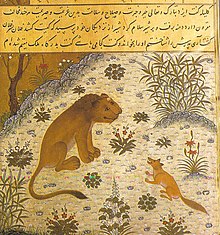Kalīla wa Dimna

Kalīla wa Dimna ( Arabic كليلة ودمنة, DMG Kalīla wa-Dimna 'Kalila and Dimna') is the Arabic version of a literary material, the beginnings of which go back to the time of the Kushana and Sassanids in Persia (2nd century BC to 6th century AD) and which has been handed down in Sanskrit as the ancient Indian poetry Panchatantra .
Pandsch means "five" in Indo-Iranian languages and tantra originally means "tissue". This collection of fables , fairy tales and stories was used in the Indo-Iranian culture as material for upbringing at court, especially since Panchatantra can mean “five senses” or “five muses”.
In the 6th century Burzoe translated the Sanskrit text into Middle Persian . Ibn al Muqaffa translated the Indo-Iranian material from Middle Persian into Arabic in the 8th century. In 1251, Alfonso X , then still crown prince, had a translation made into Old Spanish . The prose version of the animal stories, which have now been translated into over sixty languages around the world, is part of world literature . It was translated into German in 1837. A Turkish version of the book was discovered in the Gotha State Library in the 19th century.
In the area of present-day Afghanistan the work written in bound language is often referred to as ( panǧ ketāb or) Pandsch Ketab (“Five Books”) and rarely as Kalīla wa Dimna . With the help of these “books”, the children in the village school, the Koran school and in the families learned to read and write with particular fun.
From Panchatantra or Kalila wa Dimna there are a lot of expenses that are transmitted in several languages. Kalīla wa Dimna has been known in Europe since the 11th century.
Rudaki's masterpiece is a version of Kalīla wa Dimna , which he wrote in verse in New Persian . Abū l-Qasem-e Ferdousī dedicated a chapter of his Shahnama ("Book of Kings") with a total of 134 lines to this instructive, entertaining and humorous collection of fables by Rudaki.
German-language editions
- Seyfeddin Najmabadi. Siegfried Weber (ed., Translation): Nasrollah Monschi: Kalila and Dimna. Fables from Classical Persia . Publishing house CH Beck. Munich 1996
- Johannes Niehoff-Panagiotidis : Translation and Reception. The Byzantine-Modern Greek and Old Spanish versions of 'Kalîla wa Dimna'. Dr. L. Reichert Verlag, Wiesbaden 2003 (Serta Graeca, 18).
- Philipp Wolff : Calila and Dimna or Bidpai's fables. 2 ribbons. Scheible, Stuttgart 1837 ( digitized volume 2 ); 2nd edition as The Book of the Wise in lustful and instructive stories by the Indian philosopher Bidpai. 2 parts. Scheible, Stuttgart 1839 ( digitized version ).
